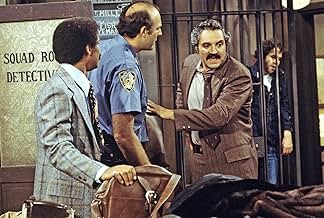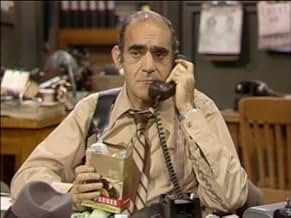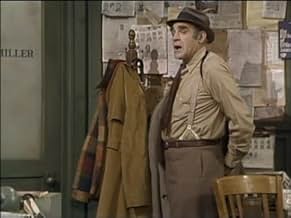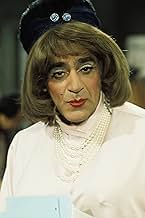अपनी भाषा में प्लॉट जोड़ेंThe Captain of the NYPD 12th Precinct and his staff handle the various local troubles and characters that come into the squad room.The Captain of the NYPD 12th Precinct and his staff handle the various local troubles and characters that come into the squad room.The Captain of the NYPD 12th Precinct and his staff handle the various local troubles and characters that come into the squad room.
- 3 प्राइमटाइम एमी जीते
- 9 जीत और कुल 43 नामांकन
एपिसोड ब्राउज़ करें
फ़ीचर्ड समीक्षाएं
If there was a great TV show that emphasize the decade of the 1970's,the situation comedy series "Barney Miller",was just that. This was a quality series that became one of television's greats. In perspectives,"Barney Miller" was a show that changed dramatically during the course of its seven year run,despite the fact that its plot,setting and basic cast remained the same. This was a show that quickly became one of the biggest hits for the ABC-TV network,producing 170 episodes during its seven year run on the network from the premiere episode on January 23,1975 until the final episode of the series on May 20,1982. The series was created by Danny Arnold,who served as the executive producer along with Theodore J. Flicker. Arnold also served as one of the writers of the show along with Chris Hayward. The series was produced by Arnold's production company Four D Productions in association with the ABC Television Network(the series was filmed in front of a studio audience at ABC Television Center in Hollywood).
The show was about a detective squad at a precinct house in New York City's Greenwich Village,and often the strange people from the community went in and out their door each week. At the beginning of the series,the pace of the police department was fast and the comedy a bit loud.,and the emphasis was one-on-one liners and quirkiness rather than on real characters. Captain Barney Miller(Hal Linden)was head of the precinct,very put-upon and overworked,but nevertheless always wise and friendly. Wojo(Max Gail)was the well meaning detective who was a bit lacking in smarts. Harris(Ron Glass)was funny,fashion-conscious,and cool,while Yemana(Jack Soo)was much more introverted,though he also would provide the occasional witty commentary. Fish(Abe Vigoda,who was on the show for two seasons before being spun off into their own show "Fish")was the elder statesmen,the old man on the verge of retirement who had more ailments than you could imagine. Chano(Gregory Sierra)was the normal of the bunch after Barney,and always tried to have a positive outlook despite being constantly exposed to the less inspiring side of life. Other characters that appeared were Barney's wife Liz(Barbara Barrie),Barney's supervisor Chief Inspector Frank Luger(James Gregory),and Officer Carl Levitt(Ron Carey),and Detective Arthur Dietrich(Steve Landesberg).
The detectives were racially mixed,which,at the show's inception,would occasionally provide for some comedy. Other detectives came and went after an episode or two,especially during the very early years of the series. Its amazing that "Barney Miller" survived,but it laid the groundwork for what was great comedy and the awards that this show received: It won the DGA Award from the Directors Guild of America in 1981,and it won back-to-back Emmys for Outstanding Comedy Series and Outstanding Actor in a Comedy Series(Hal Linden)in 1979,1980,and 1982. Not to mention winning the Peabody Award in 1979,and the Golden Globe for Best Television Comedy or Musical Series twice in 1976 and 1977.
Almost all of the action took place in the squad room and Barney's adjoining office,despite the fact that the station seemed very small considering its location. "Barney Miller" during the seven seasons that it ran on ABC,became a literate,well-written show with interesting characters and story lines mixed in with some grand comedy. In its later years it unfortunately suffered from "social-cause-of-the-week",syndrome by way of a'la' Lou Grant and every other socially conscious show that exploded onto TV screens in the mid-1970's and early 1980's. This was a series that is highly recommended as one of the best to come out of the 1970's and survived until its demise in the early 1980's.
The show was about a detective squad at a precinct house in New York City's Greenwich Village,and often the strange people from the community went in and out their door each week. At the beginning of the series,the pace of the police department was fast and the comedy a bit loud.,and the emphasis was one-on-one liners and quirkiness rather than on real characters. Captain Barney Miller(Hal Linden)was head of the precinct,very put-upon and overworked,but nevertheless always wise and friendly. Wojo(Max Gail)was the well meaning detective who was a bit lacking in smarts. Harris(Ron Glass)was funny,fashion-conscious,and cool,while Yemana(Jack Soo)was much more introverted,though he also would provide the occasional witty commentary. Fish(Abe Vigoda,who was on the show for two seasons before being spun off into their own show "Fish")was the elder statesmen,the old man on the verge of retirement who had more ailments than you could imagine. Chano(Gregory Sierra)was the normal of the bunch after Barney,and always tried to have a positive outlook despite being constantly exposed to the less inspiring side of life. Other characters that appeared were Barney's wife Liz(Barbara Barrie),Barney's supervisor Chief Inspector Frank Luger(James Gregory),and Officer Carl Levitt(Ron Carey),and Detective Arthur Dietrich(Steve Landesberg).
The detectives were racially mixed,which,at the show's inception,would occasionally provide for some comedy. Other detectives came and went after an episode or two,especially during the very early years of the series. Its amazing that "Barney Miller" survived,but it laid the groundwork for what was great comedy and the awards that this show received: It won the DGA Award from the Directors Guild of America in 1981,and it won back-to-back Emmys for Outstanding Comedy Series and Outstanding Actor in a Comedy Series(Hal Linden)in 1979,1980,and 1982. Not to mention winning the Peabody Award in 1979,and the Golden Globe for Best Television Comedy or Musical Series twice in 1976 and 1977.
Almost all of the action took place in the squad room and Barney's adjoining office,despite the fact that the station seemed very small considering its location. "Barney Miller" during the seven seasons that it ran on ABC,became a literate,well-written show with interesting characters and story lines mixed in with some grand comedy. In its later years it unfortunately suffered from "social-cause-of-the-week",syndrome by way of a'la' Lou Grant and every other socially conscious show that exploded onto TV screens in the mid-1970's and early 1980's. This was a series that is highly recommended as one of the best to come out of the 1970's and survived until its demise in the early 1980's.
I am a fairly young person and I was very pleased to find such a wonderful show on DVD. The title of the show through me off, but after reading a bit about the show I was intrigued and bought it.
At first the show mainly focuses on the situations and what the cops are doing, but after a while the show starts to focus only on the squad-room where the detectives convene.
Barney Miller is always getting into other peoples business. When a criminal comes in he Interrogates them and tries to get the whole story out of them and also tries to put his own opinion or label on it.
Most of the stories are very light-hearted, but some do hit close to home. The show is funny, comical, and well played, but some episodes do have a serious vibe at the end of them.
By season three the cast is permanent and the show gets its real humor on. Each detective has an impressive amount of character depth. It was interesting to learn about each of them as I watched all of the episodes. By the end, I felt as if I knew each of them personally.
The only parts of the show I didn't like was Lt. Scanlon. His character was played so well, I truly didn't like him. Inspector Luger was played by a veteran actor, but his character seemed a little dim-witted. By the end of the series, the only set you would see is the squad room. After having visited a couple different stage sets (for example: Barnies apartment, Fish's apartment and the hide-out apartment) it seemed very confining to only use the squad room in the later seasons.
The exits of Fish and Yemada were torture on the show. Fish was great when it came to quick and ironic humor while nick tried to do the same, but his character was never truly replaced.
Overall, I love this show and I continue to watch it often. The humor, the stories, the backgrounds of the people are all interesting and entertaining. This show is recommended for all who love comedy and also recommended for all who wish to enjoy a simple show.
At first the show mainly focuses on the situations and what the cops are doing, but after a while the show starts to focus only on the squad-room where the detectives convene.
Barney Miller is always getting into other peoples business. When a criminal comes in he Interrogates them and tries to get the whole story out of them and also tries to put his own opinion or label on it.
Most of the stories are very light-hearted, but some do hit close to home. The show is funny, comical, and well played, but some episodes do have a serious vibe at the end of them.
By season three the cast is permanent and the show gets its real humor on. Each detective has an impressive amount of character depth. It was interesting to learn about each of them as I watched all of the episodes. By the end, I felt as if I knew each of them personally.
The only parts of the show I didn't like was Lt. Scanlon. His character was played so well, I truly didn't like him. Inspector Luger was played by a veteran actor, but his character seemed a little dim-witted. By the end of the series, the only set you would see is the squad room. After having visited a couple different stage sets (for example: Barnies apartment, Fish's apartment and the hide-out apartment) it seemed very confining to only use the squad room in the later seasons.
The exits of Fish and Yemada were torture on the show. Fish was great when it came to quick and ironic humor while nick tried to do the same, but his character was never truly replaced.
Overall, I love this show and I continue to watch it often. The humor, the stories, the backgrounds of the people are all interesting and entertaining. This show is recommended for all who love comedy and also recommended for all who wish to enjoy a simple show.
This show was one of the reasons why the ABC would dethrone the CBS, as the number one network in prime time in the latter 1970's.
Barney Miller depicted the day to day workings of a typical New York City detectives unit. Void of overly melodramatic urban drama, and the now all too over played "tough guy" act, Barney Miller was touted as being a fair portrayal of the life of a detective (with much more levity of-course).
Even though it was first and foremost a comedy series, the writers gave us a much needed balance by injecting a bit of drama into the plot and characters themselves. This dramatic element was so well done, that it added to character development, and provided for more laughter. Their witty dialog rarely left the viewer disappointed, or without a laugh, and with entertainment being the key factor of any Television production, the cast of Barney Miller delivered in episode after episode.
However, the show was produced during a time when crime in NY City was being managed with a overly diplomatic approach. An experiment that would prove it self to be disastrous, effectuated lectures by some of the shows characters, demonstrating an endorsement of this new more "liberal" approach to fighting crime.
There is not much out there today that even comes close to what we had in Barney Miller. It seems that todays Television lacks respect for their audience, as cheap sexual gags, and one liners dominate the sitcom landscape, and leave us with vacuous and cloddish jocularity.
Barney Miller will however, be an example of what Television once was. A time when mature, plot driven humor was demanded, and the crude and immature was rejected.
Barney Miller depicted the day to day workings of a typical New York City detectives unit. Void of overly melodramatic urban drama, and the now all too over played "tough guy" act, Barney Miller was touted as being a fair portrayal of the life of a detective (with much more levity of-course).
Even though it was first and foremost a comedy series, the writers gave us a much needed balance by injecting a bit of drama into the plot and characters themselves. This dramatic element was so well done, that it added to character development, and provided for more laughter. Their witty dialog rarely left the viewer disappointed, or without a laugh, and with entertainment being the key factor of any Television production, the cast of Barney Miller delivered in episode after episode.
However, the show was produced during a time when crime in NY City was being managed with a overly diplomatic approach. An experiment that would prove it self to be disastrous, effectuated lectures by some of the shows characters, demonstrating an endorsement of this new more "liberal" approach to fighting crime.
There is not much out there today that even comes close to what we had in Barney Miller. It seems that todays Television lacks respect for their audience, as cheap sexual gags, and one liners dominate the sitcom landscape, and leave us with vacuous and cloddish jocularity.
Barney Miller will however, be an example of what Television once was. A time when mature, plot driven humor was demanded, and the crude and immature was rejected.
How come there are not more TV shows like Barny Miller? This was one of the best TV shows on TV. The writing and characters were fantastic and even though it has a 1970's feel and look to it, the show still packs a punch.
Barney Miller dealt with important topics as gay police officers and the fact that even though they are gay, they are still valuable members of society.
There are not really and funny shows anymore. What is a TV viewer suppose to watch? Friends?? Paris Hilton washing a cow. Please give me something!!!
Barney Miller dealt with important topics as gay police officers and the fact that even though they are gay, they are still valuable members of society.
There are not really and funny shows anymore. What is a TV viewer suppose to watch? Friends?? Paris Hilton washing a cow. Please give me something!!!
Of the thousands of American TV sitcoms ever produced, only a small portion of them are genuinely enjoyable and funny 40 years after their production. Barney Miller is one of those shows. More interesting than this fact, however, is that this show has many features atypical of its genre and time period:
1. Virtually all of the action (excepting a handful of scenes and the strange and mostly unenjoyable 'Wojo's Girl' 2-parter) takes place at a single location, the police station. In this way, the show is like a stage play, and of course, stunningly similar to the classic Kirk Douglas play & film 'Detective Story.'
2. There is almost no slapstick, no catchphrases, and no toilet humor.
3. Unlike the most popular sitcoms of the mid-1970's, such as 'All In the Family', 'Good Times', etc. none of the recurring cast play their characters broadly. None of them are shouting tyrants, cartoonish buffoons, dingy housewives, etc. Most of the regular cast played their characters toward the deadpan end of the comedic spectrum. (The recurring Inspector Luger, played by the great James Gregory, is gently buffoonish, but nothing like Ted Baxter or George Jefferson.) One episode is an exception to this rule, 'The Brownies,' which is one of the 10 funniest sitcom episodes ever produced. If you have seen this episode, you know why the characters were played differently this time around, and you know that the essence of the story is seeing the characters behaving different than usual.
4. With the exception of Barbara Barrie as the intermittent presence of the titular character's wife in the early episodes, there are no recurring female characters. (Just an observation, not saying this is a good thing for every sitcom.)
These facts argue in favor of the theory that artists who seek to create something of quality and durability should not always try to imitate. Doing something different can be good.
The writing and the performances are the essence of why this show is good. But also there is the faded paint and rumpled clothes, and the varying degrees of world-weariness in faces of Yamana, Fish, Capt. Miller, and Inspector Luger, which evoke the gritty, working class realities of old New York before a series of quasi-fascist mayors tried to reboot the city as a kind of fantasyland for rich people and tourists.
A final point of interest to which I will draw your attention is gentle and matter-of-fact way in which the cops interact with both 'criminals' and 'victims.' You won't see them trying to intimidate or torture criminals into confessions. There is an implicit message of compassion in this, along with the related notion that when the total circumstances of life are taken into account, the moral differences between people don't seem all that huge.
1. Virtually all of the action (excepting a handful of scenes and the strange and mostly unenjoyable 'Wojo's Girl' 2-parter) takes place at a single location, the police station. In this way, the show is like a stage play, and of course, stunningly similar to the classic Kirk Douglas play & film 'Detective Story.'
2. There is almost no slapstick, no catchphrases, and no toilet humor.
3. Unlike the most popular sitcoms of the mid-1970's, such as 'All In the Family', 'Good Times', etc. none of the recurring cast play their characters broadly. None of them are shouting tyrants, cartoonish buffoons, dingy housewives, etc. Most of the regular cast played their characters toward the deadpan end of the comedic spectrum. (The recurring Inspector Luger, played by the great James Gregory, is gently buffoonish, but nothing like Ted Baxter or George Jefferson.) One episode is an exception to this rule, 'The Brownies,' which is one of the 10 funniest sitcom episodes ever produced. If you have seen this episode, you know why the characters were played differently this time around, and you know that the essence of the story is seeing the characters behaving different than usual.
4. With the exception of Barbara Barrie as the intermittent presence of the titular character's wife in the early episodes, there are no recurring female characters. (Just an observation, not saying this is a good thing for every sitcom.)
These facts argue in favor of the theory that artists who seek to create something of quality and durability should not always try to imitate. Doing something different can be good.
The writing and the performances are the essence of why this show is good. But also there is the faded paint and rumpled clothes, and the varying degrees of world-weariness in faces of Yamana, Fish, Capt. Miller, and Inspector Luger, which evoke the gritty, working class realities of old New York before a series of quasi-fascist mayors tried to reboot the city as a kind of fantasyland for rich people and tourists.
A final point of interest to which I will draw your attention is gentle and matter-of-fact way in which the cops interact with both 'criminals' and 'victims.' You won't see them trying to intimidate or torture criminals into confessions. There is an implicit message of compassion in this, along with the related notion that when the total circumstances of life are taken into account, the moral differences between people don't seem all that huge.
क्या आपको पता है
- ट्रिवियाDuring its broadcast run, amid the many cop shows on television at the time, many real-life police officers considered this the show that best depicted the realities of police life.
- गूफ़Detective Fish has inconsistent years of service with the department. In the season one episode "The Arsonist " he mentions being on the force for 25 years. In the same seasons episode "Fish" he remarks that he went to the academy in 1937, making him a 38 year veteran.
- भाव
Yemana: Then Fish runs in the alley and he leaps over us like one of those, what do you call those things in Africa that run and leap in the air?
Detective Ron Harris: Slaves.
- क्रेज़ी क्रेडिटAt different times in the production of the series Max Gail was credited as both Max Gail and Maxwell Gail.
- कनेक्शनFeatured in The 28th Annual Primetime Emmy Awards (1976)
टॉप पसंद
रेटिंग देने के लिए साइन-इन करें और वैयक्तिकृत सुझावों के लिए वॉचलिस्ट करें
- How many seasons does Barney Miller have?Alexa द्वारा संचालित
विवरण
- रिलीज़ की तारीख़
- कंट्री ऑफ़ ओरिजिन
- भाषा
- इस रूप में भी जाना जाता है
- The Life and Times of Captain Barney Miller
- फ़िल्माने की जगहें
- उत्पादन कंपनी
- IMDbPro पर और कंपनी क्रेडिट देखें
- चलने की अवधि30 मिनट
- रंग
इस पेज में योगदान दें
किसी बदलाव का सुझाव दें या अनुपलब्ध कॉन्टेंट जोड़ें









































